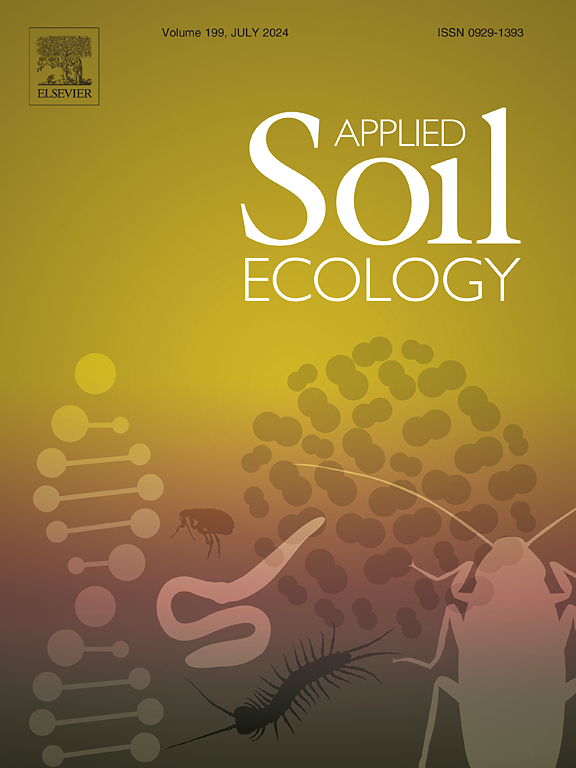Microbially mediated mechanisms underlie N2O mitigation by bio-organic fertilizer in greenhouse vegetable production system
IF 4.8
2区 农林科学
Q1 SOIL SCIENCE
引用次数: 0
Abstract
Bio-organic fertilizer substitution for chemical fertilizer is an important action for nature-based solutions to identify optimal management practices at reducing soil N2O emissions. However, the current understanding of the underlying microbial mechanisms in response to bio-organic fertilizer substitution for chemical fertilizer is primitive, particularly in greenhouse vegetable production system. Herein, we present the field experiment that spans five years and encompasses four treatments, including no fertilizer (CK), chemical fertilizer (CF), bio-organic fertilizer (OF), and chemical fertilizer combined with bio-organic fertilizer (COF) in the greenhouse vegetable production system. We aimed to investigate the effects of replacing chemical fertilizer with bio-organic fertilizer on soil N2O emissions and nitrogen-cycling microbial communities. The OF and COF treatments reduced soil N2O emissions by 70.2 % and 32.3 %, respectively, compared with the CF treatment. The substitution of chemical fertilizer with bio-organic fertilizer led to a reduction in residual nitrate and dissolved organic nitrogen levels in the soil. Additionally, it enhanced the abundance of functional genes associated with both soil assimilatory nitrate reduction and dissimilatory nitrate reduction processes. These changes likely facilitated the conversion of nitrate nitrogen to ammonium nitrogen and mitigated soil denitrification. Additionally, bio-organic fertilizer significantly (P < 0.05) decreased the activity of soil-denitrifying microorganisms and increased the abundance of soil nitrogen-fixing genes to reduce N2O emissions. These results indicate the potential of using bio-organic fertilizer instead of chemical fertilizer to reduce reactive nitrogen emissions in greenhouse vegetable production system, which can contribute to the development of environmentally friendly fertilization strategies.

温室蔬菜生产系统中生物有机肥缓解N2O的微生物介导机制
生物有机肥替代化肥是基于自然的解决方案确定减少土壤N2O排放的最佳管理实践的重要行动。然而,目前对生物有机肥替代化肥的潜在微生物机制的理解是原始的,特别是在温室蔬菜生产系统中。在此,我们进行了为期5年的大田试验,包括在温室蔬菜生产系统中不施肥(CK)、化肥(CF)、生物有机肥(OF)和化肥与生物有机肥(COF) 4种处理。本研究旨在探讨生物有机肥替代化肥对土壤N2O排放和氮循环微生物群落的影响。与CF处理相比,OF和COF处理分别减少了70.2%和32.3%的N2O排放。用生物有机肥代替化学肥料导致土壤中残留硝酸盐和溶解有机氮水平降低。此外,它还增加了与土壤同化性硝酸盐还原和异化性硝酸盐还原过程相关的功能基因的丰度。这些变化可能促进了硝态氮向铵态氮的转化,减缓了土壤的反硝化作用。此外,生物有机肥显著(P <;0.05)降低了土壤反硝化微生物的活性,增加了土壤固氮基因的丰度,以减少N2O的排放。这些结果表明,在温室蔬菜生产系统中,使用生物有机肥代替化学肥料可以减少活性氮的排放,从而为开发环境友好型施肥策略提供依据。
本文章由计算机程序翻译,如有差异,请以英文原文为准。
求助全文
约1分钟内获得全文
求助全文
来源期刊

Applied Soil Ecology
农林科学-土壤科学
CiteScore
9.70
自引率
4.20%
发文量
363
审稿时长
5.3 months
期刊介绍:
Applied Soil Ecology addresses the role of soil organisms and their interactions in relation to: sustainability and productivity, nutrient cycling and other soil processes, the maintenance of soil functions, the impact of human activities on soil ecosystems and bio(techno)logical control of soil-inhabiting pests, diseases and weeds.
 求助内容:
求助内容: 应助结果提醒方式:
应助结果提醒方式:


